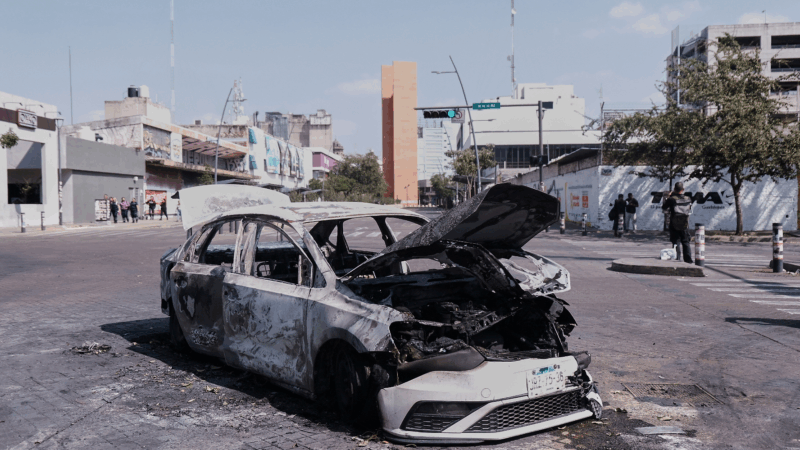Hate groups in the US decline but their influence grows, report shows
White nationalist demonstrators walk into the entrance of Lee Park surrounded by counter demonstrators in Charlottesville, Va., Saturday, Aug. 12, 2017.
By Terry Tang
The number of white nationalist, hate and anti-government groups around the U.S. dropped slightly in 2024, not because of any shrinking influence but rather the opposite. Many feel their beliefs, which includes racist narratives and so-called Christian persecution, have become more normalized in government and mainstream discourse.
In its annual Year in Hate and Extremism report, released Thursday, the Southern Poverty Law Center said it counted 1,371 hate and extremist groups, a 5% decline. The nonprofit group attributes this to a lesser sense of urgency to organize because their beliefs have infiltrated politics, education and society in general. Some of the ways they have done this are through pushing for bans on diversity, equity and inclusion initiatives, book bans and protests of drag story hours, the report says.
Last year, there were 533 active hate groups. These include groups who express views that are anti-LBGTQ+, anti-immigrant, antisemitic and anti-Muslim. This number has been steadily declining since reaching a historic high of 1,021 in 2018.
“The trends have slightly sort of gone up and down but let’s just say generally, since our tracking, have increased. And that’s not just on a total numbers level but also on a per capita,” said Rachel Carroll Rivas, interim director of the SPLC’s Intelligence Project.
The number of anti-government groups last year totaled 838, an increase from recent years, according to the law center based in Montgomery, Alabama, that tracks racism, xenophobia and far-right militias. These groups see the federal government as “tyrannical” and include militias and self-described sovereign citizens.
Male supremacy also continues to emerge as an influential hate group. The SPLC documented seven new male supremacist hate groups, making the total 16. Their rhetoric espouses misogyny and strict gender roles. Their rising influence came during an election year when the country saw a woman of color be the first presidential nominee for a major political party.
“I’m not sure it’s a direct result of the candidacy of Kamala Harris,” Rivas said. However, SPLC researchers went into chatrooms of white supremacist organizations during the election and found “intense vilification, the claiming of demonization of Harris as well as just the pushing of the idea falsely that women would not be qualified.”
Some people on the far right have also pushed a belief that white Christian culture is being threatened by a “demographic crisis” including fewer births.
“Politicians, pundits and provocateurs on the right have turned toward demonic language to tar those who disagree with them,” the report states.
Last year’s report found “record numbers” of white nationalist and anti-LGBTQ groups in 2023. The analysis highlighted how far-right groups tried to waylay democracy through disinformation, false conspiracy theories and threats to election workers. It also examined how supporters of Christian supremacy used similar topics to organize a movement toward authoritarianism.
The SPLC is a liberal advocacy organization that, besides monitoring hate groups, files lawsuits over justice issues and offers educational programs to counter prejudice. Frequently criticized by conservatives as biased, the nonprofit has faced lawsuits for its designation of some organizations as hate groups.
The report’s release comes as a Los Angeles college professor makes his first public appearance since he was severely injured in a hit and run that he reported as a hate crime. He is scheduled to speak Thursday morning at the Chinese American Museum in downtown Los Angeles.
Aki Maehara, 71, was riding his electric bicycle in Montebello, 10 miles (16 kilometers) east of downtown Los Angeles, on April 29 when he says he heard a driver yell a racial slur. Maehara says a car then struck him and the driver fled. He was hospitalized with a concussion, neck injury, cheek bone fracture and bruises and swelling up and down his body.
Maehara, who is Japanese American, teaches a course on the history of racism in the U.S. at East Los Angeles College.
The Montebello Police Department is investigating.
Photos of his injuries posted to a GoFundMe page have been shared multiple times on social media with users calling for hate crime charges. The crowdsourcing campaign has raised almost $77,000 for Maehara.
Newly discovered dinosaur species was a fish-eater with a huge horn
The semi-aquatic dinosaur, Spinosaurus mirabilis, was discovered by an international team of scientists working in Niger.
Reporters’ notebook: The Olympics closing ceremony is way more fun than you’d think
Olympics opening ceremonies tend to get more love than their closing counterparts. But a pair of NPR reporters who watched both in Italy left with a newfound appreciation for the latter.
Northeast readies for a major winter storm, with blizzard warnings in effect
New Jersey through Massachusetts could see 2 feet of snow. New York City's mayor said the city had not "seen a storm like this in a decade."
Mexican army kills leader of Jalisco New Generation Cartel, official says
The Mexican army killed the leader of the powerful Jalisco New Generation Cartel, Nemesio Rubén Oseguera Cervantes, "El Mencho," in an operation Sunday, a federal official said.
Ukraine’s combat amputees cling to hope as a weapon of war
Along with a growing number of war-wounded amputees, Mykhailo Varvarych and Iryna Botvynska are navigating an altered destiny after Varvarych lost both his legs during the Russian invasion.
University students hold new protests in Iran around memorials for those killed
Iran's state news agency said students protested at five universities in the capital, Tehran, and one in the city of Mashhad on Sunday.







